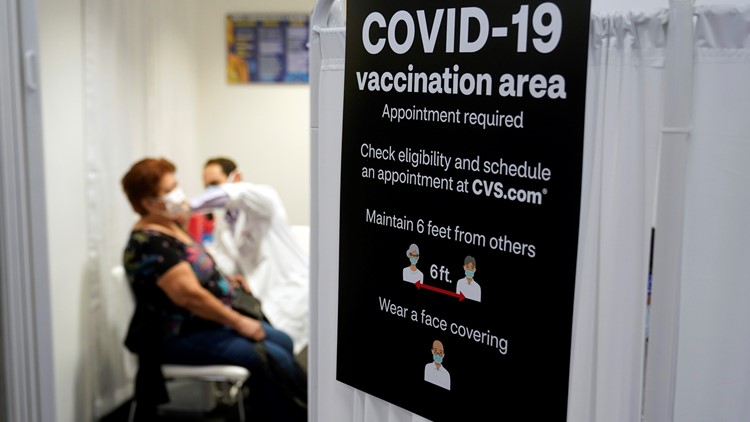Tens of millions of people have been vaccinated for COVID-19 in the United States as the vaccine rollout continues to expand across the country.
But as more people have become vaccinated, there have been reports of vaccinated people still getting the virus. While those reports are few and expected by health experts, they’ve left some confused about the effectiveness of the vaccines.
THE QUESTION
Can you get COVID-19 after being vaccinated?
THE SOURCES
- Centers for Disease Control and Prevention
- U.S. Food and Drug Administration
- Dr. Anthony Fauci, director of the National Institute of Allergy and Infectious Diseases
THE ANSWER
Yes, people vaccinated for COVID-19 can still get the disease, although the likelihood of vaccinated people getting the virus is far less compared to people who have not been vaccinated.
WHAT WE FOUND
The Centers for Disease Control and Prevention (CDC) says the vaccines are teaching the body how to combat the virus that causes COVID-19. The vaccines won’t eliminate the potential infection of COVID-19 as long as community transmission of the virus continues. There have been more than 60,000 new cases a day reported in the United States over the last week, according to the CDC, signaling there is still community spread of the virus as the majority of people have not yet been vaccinated.
Over the last few weeks, some states have reported breakthrough cases, which the CDC defines as a person getting a disease they’ve already been vaccinated for. The breakthrough cases represent a very small number of the people who have been vaccinated. An even smaller number of those breakthrough cases have resulted in death.
For example, health officials in Oregon on April 8 reported 168 breakthrough cases, including three deaths, out of more than 700,000 vaccinated people. In Minnesota, the state health department on March 24 reported 89 breakthrough cases, including no deaths, out of more than 800,000 vaccinated people.
That's an infection rate many times less than the infection rate of the general unvaccinated population, which is what vaccine scientists set out to achieve. In fact, the widely-touted efficacy rates of these vaccines were measuring just that and have curbed infection rates significantly less than annual flu vaccines have historically.
The U.S. Food and Drug Administration (FDA) reported the vaccine developed by Pfizer was 95% effective in preventing COVID-19 among clinical trial participants. The vaccine developed by Moderna was 94% effective in clinical trials, the FDA said. The Johnson & Johnson vaccine was 67% effective in preventing moderate to severe/critical COVID-19 disease occurring at least 14 days after vaccination.
Dr. Anthony Fauci, the director of the National Institute of Allergy and Infectious Diseases, says it’s inevitable some people who are vaccinated for COVID-19 will still get infected.
“We see this with all vaccines in clinical trials,” Fauci said during a Monday White House press briefing. “And in the real world, no vaccine is 100% efficacious or effective, which means that you will always see breakthrough infections regardless of the efficacy of your vaccine.”
Fauci went on to explain it’s important to look at breakthrough cases through the lens of how many people have been vaccinated.
“You will always see breakthrough,” he said. “The critical issue is always look at the denominator. Look at what you are comparing it with.”
The CDC says there is growing evidence that people who have been vaccinated are less likely to have asymptomatic infection and potentially less likely to transmit the virus to others, but further investigation is ongoing.
More from VERIFY: Why Derek Chauvin isn’t wearing handcuffs in court during the jury trial
Something you’d like VERIFIED? Click here to submit your story.



